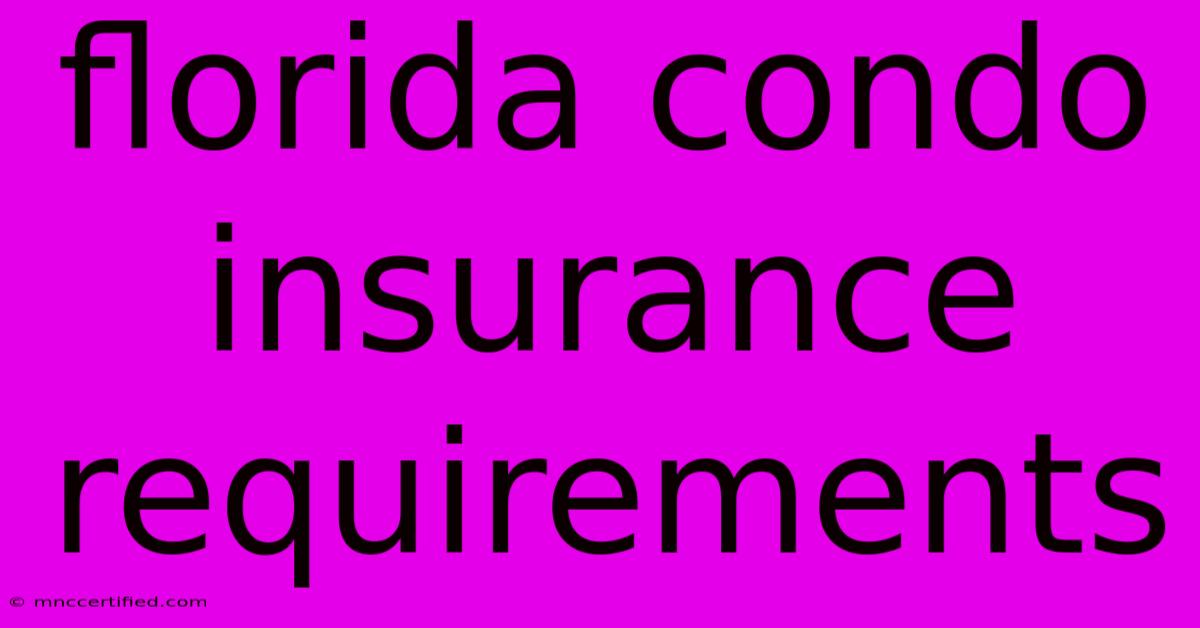Florida Condo Insurance Requirements

Table of Contents
Navigating Florida Condo Insurance Requirements: A Comprehensive Guide
Florida is known for its beautiful beaches and vibrant cities, making it a popular destination for both residents and vacationers. However, owning a condo in Florida comes with specific insurance requirements that can seem daunting. This comprehensive guide will break down the intricacies of Florida condo insurance, covering everything from essential coverage to common pitfalls and expert tips for navigating the process.
Understanding the Basics: Condo Association vs. Individual Coverage
Florida condo insurance involves two distinct layers:
1. Condo Association Master Policy: This policy covers the common areas of the building, such as the exterior walls, roof, elevators, and amenities. It's crucial to understand the extent of this coverage as it may vary between associations.
2. Individual Unit Policy: This policy protects your personal belongings and your unit's interior. It's essential to have this policy in addition to the master policy, as it fills the gaps in coverage for your specific unit.
Essential Coverages for Your Florida Condo
While every policy may differ slightly, here are some key coverages you should prioritize:
- Dwelling Coverage: Covers damage to your unit's interior, including fixtures, appliances, and built-in structures.
- Personal Property Coverage: Protects your belongings inside the unit, such as furniture, electronics, and clothing.
- Liability Coverage: Provides protection against lawsuits if someone is injured on your property.
- Loss of Use Coverage: Covers living expenses if you're unable to live in your unit due to a covered event.
- Flood Insurance: A separate policy required in flood-prone areas, as standard policies generally don't cover flood damage.
Common Pitfalls to Avoid
Navigating Florida condo insurance can be tricky. Avoid these common pitfalls to ensure you have adequate coverage:
- Underinsurance: Don't underestimate the value of your belongings and ensure sufficient coverage for both your unit and personal property.
- Ignoring Flood Risk: Even if you're not in a designated flood zone, consider flood insurance as the risk is increasing in many areas.
- Assuming the Association's Coverage is Enough: Remember, the association's policy only covers the building's common areas, not your individual unit's interior.
- Not Reviewing the Policy Regularly: Review your policy annually to ensure it still meets your needs and reflects any changes in your belongings or risk factors.
Expert Tips for Getting the Right Coverage
- Communicate with Your Association: Understand the details of the master policy and any additional requirements for individual coverage.
- Shop Around: Get quotes from multiple insurance companies to compare rates and coverage options.
- Consider Discounts: Ask about discounts for security systems, smoke detectors, and other safety features.
- Consult with an Insurance Agent: An experienced agent can help you understand your specific needs and tailor a policy that provides adequate protection.
Conclusion
Understanding Florida condo insurance requirements is essential for any condo owner. By understanding the basics, avoiding common pitfalls, and following expert tips, you can ensure you have the right coverage to protect your investment and peace of mind. Remember, a well-informed approach to insurance can save you from financial hardship in the event of an unexpected event.

Thank you for visiting our website wich cover about Florida Condo Insurance Requirements. We hope the information provided has been useful to you. Feel free to contact us if you have any questions or need further assistance. See you next time and dont miss to bookmark.
Featured Posts
-
Convenience Store Insurance Coverage
Nov 11, 2024
-
La Liga Live Real Sociedad Vs Barcelona On Eurosport
Nov 11, 2024
-
Brighthouse Long Term Care Insurance
Nov 11, 2024
-
Sp Braga Vs Sporting 2 4 Score Match Summary
Nov 11, 2024
-
Southern Financial Life Insurance Co
Nov 11, 2024